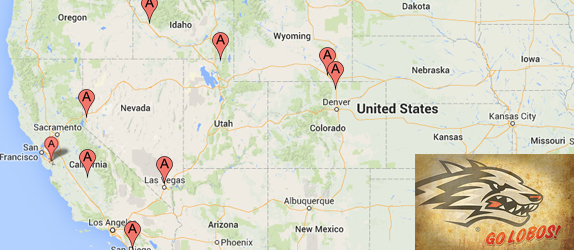
Dear Mountain West Commissioner,
The Lobos have finished first in the league the past two years, and last season, UNM was the only team during conference competition with a winning record on the road. Across the sports world, this success would garner respect--and, in some instances, even advantages--but the Lobos receive neither from the Mountain West.
The Mountain West has a history of favoring its successful teams. This trend is obvious in football schedules. During TCU’s 2010 undefeated campaign, the Conference scheduled the winless Lobos as the Horned Frogs’ last game. The following year when powerhouse Boise State joined the Mountain West, the Conference again served UNM as the sacrifice in the final game. Both situations reveal the Conference’s intentions: the schedules were designed, so the best football teams had easy wins when the pressure was greatest. Conferences use similar strategies all the time.
Now I am not writing to encourage the Mountain West to design the basketball schedule to offer an unfair advantage to the Lobos, but, rather, I would like to express my concern regarding this year’s treacherous schedule for UNM. The Lobos face a combination of scheduling burdens that no other Mountain West team must overcome.
With Utah State and San Jose State joining the Conference this year, the 11-team league faced new challenges, and the Mountain West followed a few just parameters in designing the basketball schedule. Each team plays an unbalanced 18-game conference schedule. This means a team plays a home-and-home series with eight schools then drops a home game and an away game against the other two schools. Playing nine home games and nine road games, each team’s home-and-away load is distributed evenly by the nine-game midpoint in the league season. So a team with five home games in the first nine matches will play four home games in the second half of the season--or vice versa. This is where the league’s scheduling equity stops and the Lobo burden begins.
While every team plays five road games in a nine-game period, the Lobos’ schedule concentrates five road games into a seven-game period with no bye in sight. As the Journal reported, this schedule sent the Lobos traveling for an unprecedented 17 days during a 23-day period in January. No other Mountain West competitor is required to endure such a stretch, and it is because the Conference scheduled UNM’s two back-to-back road series close together.
In league play, all teams play one back-to-back road series, but only six teams play more than one set of back-to-back road games. Air Force is the only team competing in three back-to-back road series, but the Falcons’ schedule contains intentional road swings--UNLV to Fresno St, Boise St to Nevada, and SJSU to San Diego State. These pairings limit the Falcon’s time on the road. Air Force also benefits from the thoughtful placement of byes--one before a road swing and the other after one. The Lobos’ back-to-back series took them from Wyoming to SJSU and from Colorado St to Utah St--neither pairing the most logical for a road swing.
SDSU and Fresno St play two back-to-back road series, but they are separated with a bye and five-weeks apart. Utah St plays two back-to-back away series, and while the Aggies do not have a bye between road trips, the two sets of games are again separated by five weeks.
Only the Lobos and Nevada play two back-to-back series in close succession. Nevada’s back-to-back road series were separated by 10 days during which the Wolf Pack played two home games. The Lobos’ back-to-back series seem to be separated by a more favorable 13-day interval, but, between the two sets of road series, the team traveled home from SJSU to play UNLV, then traveled to Fresno St, returned home again to take on Boise St, then picked up to go to Colorado St starting the second back-to-back road series. Any coach would choose Nevada’s week at home over UNM’s yo-yo travel schedule.
The Conference also did not do the Lobos any favors in scheduling the team’s byes. In a grueling 18-game league season, teams want byes to break up long stretches of games to offer time to rest and heal. Coaches also want their byes before big games to prepare properly. UNLV’s conference schedule provides these byes. After three games, the Runnin’ Rebels took a mid-January bye, before a road trip to Albuquerque and San Diego. UNLV’s second bye comes in mid-February, one game before the rematch with the Lobos. With this set up, the Runnin’ Rebels never play more than seven-consecutive league games without a break.
Wyoming received the worst bye scheduling. Tipping off their fourth conference game in January, the Cowboys had experienced both byes and began 15-consecutive matches to end the season. The Lobos, along with Wyoming and Boise St, opened the season with bye and received no intermission in conference play. This left UNM to play 10-straight games then, after the second bye, go on a nine-game stretch. Of the teams opening the season with a bye, the Lobos are the only one to play two back-to-back road series.
This season, the Lobos’ unbalanced schedule drops two games, one at Air Force and another to Fresno St. Both teams dropped by the Lobos are in the lower half of the standings and would have presented likely wins. First-place SDSU drops two would-be difficult games, one at Nevada and the other against Wyoming. Third-place Nevada does not host SDSU or go to Colorado St. Fourth-place UNLV drops SJSU, the only winless team in the league, but they do not play a dangerous Boise St team twice. In other words, the Lobos drop two likely wins while the other top contenders drop one or two difficult games.
I am not prepared to say the Mountain West intentionally gave the Lobos a difficult conference road--I’ll wait for next year’s schedule to say that--but clearly the Conference did not do the Lobos any favors. To a fan putting together circumstantial evidence, the Mountain West seems to be either challenging the Lobos or punishing them.
By making the Lobos endure a gauntlet of competition, the Mountain West is not doing any of its teams favors. This year, the Conference is 4-38 against top-50 teams and most brackets project two Mountain West teams in the NCAA tournament. If the Lobos lose a game because of a strenuous schedule, and not because of a difficult opponent, one of league’s top teams will damage its March résumé, and the Conference may lose a team in the Big Dance.
Go Lobos!
Yours in Section K
P.S. Traveling in the Mountain West is strenuous for all comers, but the Conference needs to figure out how to support teams. The Big 12’s Oklahoma and the Big Ten’s Michigan St only play two of their nine conference road games farther than a six hour drive from campus. The Lobos closest road trip this season takes them to Colorado St, which is nearly seven-and-a-half hours away by bus. These distances make it impossible for the team to do anything but fly to every conference game. Traveling takes its toll. Mountain West teams enter the post season having logged thousands of miles and hours upon hours of travel, and when you’re as big as Alex Kirk, the time cramped in an airplane seat matters. Competing against less-traveled opponents may be one reason Mountain West teams fall flat in post-season play.
The Mountain West needs to study how to design a schedule more conducive for student athletes, competitive teams, school budgets, and the environment.



Responses to “Section K: Lobos Given Treacherous Conference Road Schedule”